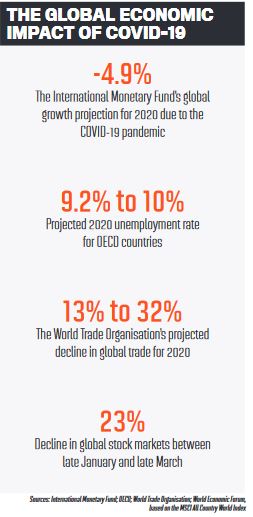

As the COVID-19 crisis continues to unfold, the insurance industry’s focus is slowly shifting from the immediate effects of the pandemic to its longer-term implications. One top concern is the industry’s exposure to litigation and the impact that class action lawsuits might have on both the finances and reputation of insurance companies.
There are several factors that could drive coronavirus-related litigation against the insurance industry, several of which are already playing out. These factors include the capacity of a claim to make or break a policy-holder’s business (and the prominent media attention around this issue), the adequacy of coverage and advice given to policyholders, and the financial sturdiness of insurers.
“Clients are now going to be turning to their broker and asking whether there is cover, and if there isn’t cover, why not?” Richard Booth, RPC
Business interruption (BI) coverage has been at the heart of many pandemic-related disputes in Australia. According to Llinos Kent, senior associate for the Sydney team of global law firm Kennedys, “In Australia, while the COVID-19 outbreak has been less severe than in the UK, the consequences of lockdown for businesses and individuals have been repli-cated. The claims landscape for brokers is likely to be similar to that predicted in the UK.”
The factors that make the coronavirus pandemic such a high-stakes scenario for insurers and policyholders could also have reverberating consequences for insurance brokers. Although COVID-19-related claims against brokers have been far fewer in number, they are trickling in and have resulted in several lawsuits.
“These lawsuits generally allege that brokers failed to accurately communicate to their policyholders the scope of coverage purchased and/or did not procure policies that ... cover BI losses arising from viruses or even from a pandemic,” Wirtshafter says. “That, of course, begs the question as to whether such coverage was even available.”
Matthew Kramer, EVP of professional liability at Arch Insurance, stresses that brokers “[must] be aware of the exposures they face on a daily basis. As evidenced recently with the pandemic, unexpected exposures can come to light very quickly. However, if the broker is listening to their client’s needs and is educated and aware of the availability of coverage in the marketplace, they can poten-tially avoid liability.”
Kramer also notes that allegations against brokers can arise from misalignment between the client’s expectations and what was ulti-mately delivered.

“The claims landscape for brokers [in Australia] is likely to be similar to that predicted in the UK” Llinos Kent, Kennedys
Fleur Rochester, London partner at Kennedys, adds: “Some policyholders may argue that their broker breached an ongoing duty to advise them to review their insurance programs during the window of opportunity between the first reported case of COVID-19 ... and the market’s widespread refusal to provide relevant extensions or endorsements as the potential scale of the pandemic grew clearer.”
Paul Castellani, another London partner at Kennedys, adds that “where policyholders suffer a loss to which their insurance cover does not – or does not adequately – respond, it is inevitable that they will look at the role their broker played in placing the insurance and advising them on what cover they required”.
Going forward, brokers will no doubt be careful to present policyholders with the full array of business interruption cover available in the market and record those discussions. “In the future,” Rochester says, “it will not be possible for brokers to say there was no breach of duty because they could not be expected to anticipate a pandemic of this magnitude.”
Kramer adds that the best way for brokers to mitigate exposure is “through clear communication and documentation with their clients. One of the easiest allegations to make is a client stating that if they were aware of coverage, they would have bought said coverage. A broker must be transparent about what they have access to and the affordability of certain coverages. They must get responses from clients in writing in an effort to protect all parties.”
